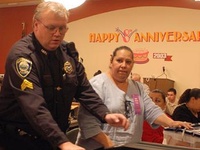
Election staffers do their part in “The Count” last night at Cambridge Senior Center. The Count is a city tradition.
Avid onlookers cram into the hallway of the Cambridge Senior Center to make room for ballot boxes as election staffers struggle find order—and data—in an endless stream of identical envelopes, confused poll attendants, and failing technology.
“The Count”—as it is known to dozens of local cognoscenti—organizes the results of Cambridge’s unique and abstruse voting system through an equally intricate tallying process.
At the 2003 incarnation of The Count last night, mechanics were the hard part.
Under Cambridge’s extremely rare “proportional representation” voting system, a system designed to give minority groups within the city a seat at the table of power, each voter ranks favored candidates.
When a candidate gets enough votes to reach “quota,” the threshold for election, the rest of his or her votes are transferred to the next candidate on the ballot.
In the city council race, a candidate needs just 10 percent of the electorate to fall into his column in order to be elected—meaning that in a city with about 20,000 voters, roughly 2,000 pick each city councillor.
Representatives from the first precincts begin reporting at quarter to nine, shortly after the polls close, pushing through a growing crowd of locals chatting on one end of the room. The election will determine Cambridge's new city councillors and school committee members, and many in the the crowd sport buttons endorsing favored candidates. For most, The Count is not a new experience.
“This is a junkie state, here,” says Winters, an expert on Cambridge politics who edits a website called the Cambridge Civic Journal (www.rwinters.com).
Unlike the election staffers, who bear different colored ribbons depending on their role and party affiliation, Winters dons a white “viewer” ribbon—an official distinction that once carried special status.
Years ago, he recalls, the viewers would stare down each ballot box as it arrived, their necks craning over a metal railing separating the counting staff from its audience.
But today, the railing has been replaced by a slack plastic chain looping among short poles that the crowd repeatedly knocks over, and Winters’ white ribbon means absolutely nothing, he says.
Among all the viewers, official or not, memories run high.
John Born, whose wife Kathy won a council seat a decade ago, speaks fondly of the halcyon days of hand-counting when The Count required a good chair, a lunch box and formidable patience.
He recalls waiting until Sunday to hear the results of a Tuesday election.
Today, the bonhomie of an extended vigil has transmuted into the vigor of a cocktail party. Viewers in conversation clusters speculate about the election outcome and bring each other up to date on the latest in Cambridge politics.
Read more in News
Quincy Considers Restrictions













